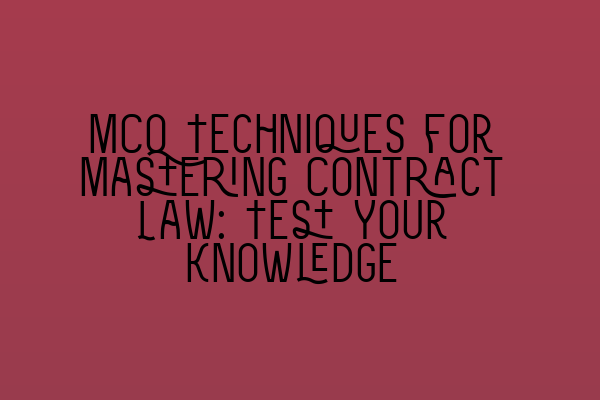MCQ Techniques for Mastering Contract Law: Test Your Knowledge
Welcome to our comprehensive guide on MCQ techniques for mastering Contract Law. Whether you are a law student preparing for exams or a legal professional looking to sharpen your skills, this post will provide you with valuable insights and strategies to excel in Contract Law multiple-choice questions (MCQs).
MCQs are widely used by law schools and professional licensing bodies to assess candidates’ knowledge and understanding of key legal concepts. These questions require you to select the correct answer from a list of options. While MCQs may seem straightforward, they often hide intricate nuances that can trip up even the most diligent students.
To help you navigate the complexities of Contract Law MCQs, we have compiled a list of effective techniques that will enhance your ability to analyze questions, identify the correct answers, and eliminate distractors.
1. Understand the Legal Principles:
Before delving into MCQ practice, ensure you have a solid understanding of the fundamental legal principles and concepts of Contract Law. This includes key elements of a contract, formation, termination, breach, remedies, and the principles of interpretation. Familiarize yourself with leading cases and statutes relevant to Contract Law. For more insights into legal practice and decision-making, check out our article on Unveiling Real-Life Case Studies: Insights into Legal Practice and Decision-Making.
2. Read the Question Carefully:
Take your time to read the question thoroughly and understand what it is asking. Identify the key issues and legal principles at play. Pay close attention to specific facts, dates, and parties involved. This will help you narrow down the options and identify potential pitfalls.
3. Analyze All Answer Options:
Carefully analyze every answer option before making your selection. Avoid jumping to conclusions or choosing the first seemingly correct option. Understand the nuances and subtle differences between the choices. Identify any words or phrases that may alter the meaning or logic of the answer.
4. Eliminate Distractors:
One of the most effective strategies in MCQs is the process of elimination. Start by eliminating obviously incorrect options. Look for choices that contain extreme or absolute language, irrelevant information, or contradict the facts provided. Narrow down the options by focusing on the remaining plausible choices.
5. Apply Legal Reasoning:
Use your knowledge of Contract Law to reason through each option. Consider the legal principles, precedent cases, and statutes that may apply to the given question. Compare and contrast the options, weighing their strengths and weaknesses. Refer to your study materials or textbooks for guidance on complex legal issues.
6. Watch Out for Traps:
MCQs often include traps designed to test your ability to spot errors and inconsistencies. Be cautious of answer options that may sound correct at first glance, but upon closer examination, contain subtle mistakes or incorrect legal interpretations. Be wary of options that are too broad or too narrow in scope.
7. Practice, Practice, Practice:
Like any other skill, mastering Contract Law MCQs requires consistent practice. Set aside dedicated time to answer a variety of MCQs, focusing on different areas of Contract Law. Familiarize yourself with past exam questions and consider joining study groups or utilizing online question banks. This practice will enhance your ability to spot patterns and develop a systematic approach to solving MCQs.
For a broader understanding of the legal profession, make sure to explore our articles on Exploring Solicitor Salaries in the UK: Average Earnings and Factors Affecting Income and Mastering Client Relationship Management: Skills for Solicitors to Enhance Trust and Loyalty.
Remember, the key to success in Contract Law MCQs lies in comprehensive preparation, attention to detail, and applying sound legal reasoning. By integrating these techniques into your study routine and continuously practicing, you’ll be well-equipped to excel in Contract Law examinations and professional assessments.
Are you considering a career in law? Check out our insightful article on Pursuing a Law School Education in the UK: Choosing the Right Path for Your Future.
For aspiring solicitors, securing training contracts is a crucial step. Find guidance and a roadmap in our article on Securing Training Contracts: A Roadmap to Becoming a Solicitor, as you embark on your journey towards becoming a qualified solicitor.
Good luck with your Contract Law studies and may your MCQ techniques lead to success!
